Financial System Adaptability and Resilience
This research group investigates critical aspects of financial system adaptability and resilience. First, it analyses the impact of natural disasters on financial systems. Second, the group aims to investigate the effects of political preferences for the green transition. Third, the group's research analyses the role of culture in economies.
Research Cluster
Financial Resilience and RegulationYour contact

- Department Financial Markets
EXTERNAL FUNDING
08.2022 ‐ 07.2025
OVERHANG: Debt overhang and green investments - the role of banks in climate-friendly management of emission-intensive fixed assets
The collaborative project “Debt Overhang and Green Investments” (OVERHANG) aims to investigate the role of banks in the climate-friendly management of emission-intensive fixed assets. This will identify policy-relevant insights on financial regulation, government-controlled lending and financial stability, as well as raise awareness among indebted stakeholders.
01.2015 ‐ 12.2019
Interactions between Bank-specific Risk and Macroeconomic Performance
07.2016 ‐ 12.2018
Relationship Lenders and Unorthodox Monetary Policy: Investment, Employment, and Resource Reallocation Effects
We combine a number of unique and proprietary data sources to measure the impact of relationship lenders and unconventional monetary policy during and after the European sovereign debt crisis on the real economy. Establishing systematic links between different research data centers (Forschungsdatenzentren, FDZ) and central banks with detailed micro-level information on both financial and real activity is the stand-alone proposition of our proposal. The main objective is to permit the identification of causal effects, or their absence, regarding which policies were conducive to mitigate financial shocks and stimulate real economic activities, such as employment, investment, or the closure of plants.
Refereed Publications
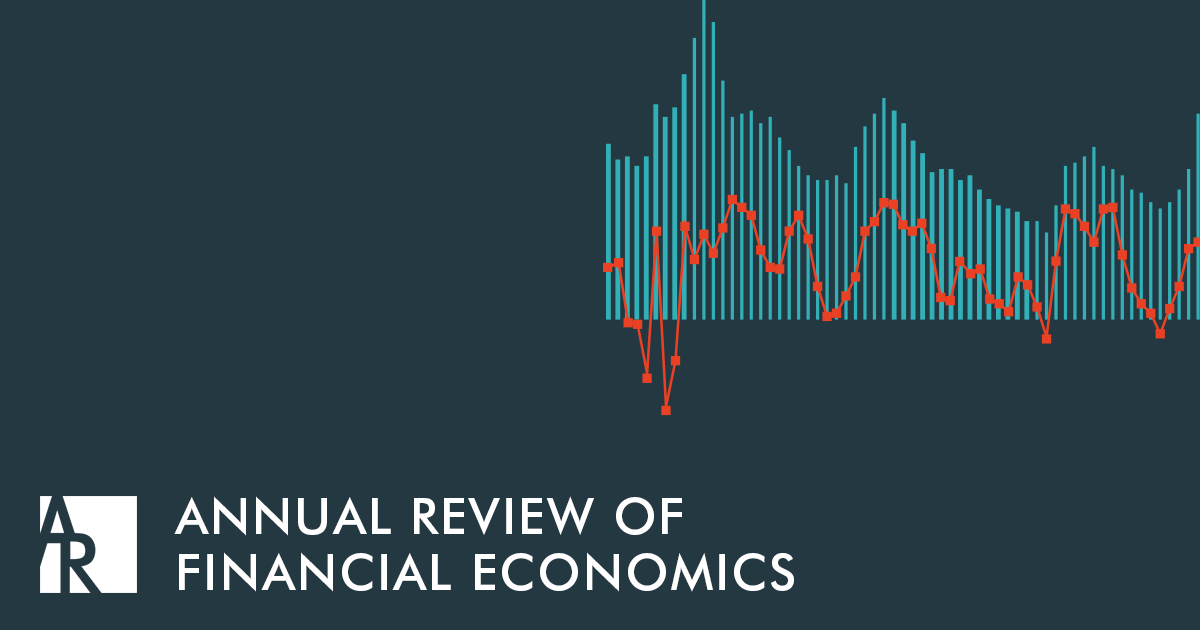
A Review of Empirical Research on the Design and Impact of Regulation in the Banking Sector
in: Annual Review of Financial Economics, 2015
Abstract
We review existing empirical research on the design and impact of regulation in the banking sector. The impact of each individual piece of regulation may inexorably depend on the set of regulations already in place, the characteristics of the banks involved (from their size or ownership structure to operational idiosyncrasies in terms of capitalization levels or risk-taking behavior), and the institutional development of the country where the regulation is introduced. This complexity is challenging for the econometrician, who relies either on single-country data to identify challenges for regulation or on cross-country data to assess the overall effects of regulation. It is also troubling for the policy maker, who has to optimally design regulation to avoid any unintended consequences, especially those that vary over the credit cycle such as the currently developing macroprudential frameworks.
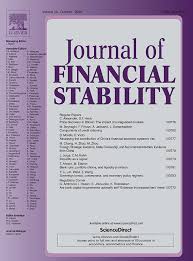
The Impact of Securitization on Credit Rationing: Empirical Evidence
in: Journal of Financial Stability, 2015
Abstract
We study whether banks’ involvement into different types of securitization activity – asset backed securities (ABS) and covered bonds – in Spain influences credit supply before and during the financial crisis. While both ABS and covered bonds were hit by the crisis, the former were hit more severely. Employing a disequilibrium model to identify credit rationing, we find that firms with banks that were more involved in securitization see their credit constraints more relaxed in normal periods. In contrast, only greater covered bonds issuance reduces credit rationing during crisis periods whereas ABS aggravates these firms’ credit rationing in crisis periods. Our results are in line with the theoretical predictions that a securitization instrument that retains risk (covered bond) may induce a more prudent risk behavior of banks than an instrument that provides risk transferring (ABS).

Bank Market Power, Factor Reallocation, and Aggregate Growth
in: Journal of Financial Stability, 2015
Abstract
Using a unique firm-level sample of approximately 700,000 firm-year observations of German small and medium-sized enterprises (SMEs), this study seeks to identify the effect of bank market power on aggregate growth components. We test for a pre-crisis sample whether bank market power spurs or hinders the reallocation of resources across informationally opaque firms. Identification relies on the dependence on external finance in each industry and the regional demarcation of regional banking markets in Germany. The results show that bank markups spur aggregate SME growth, primarily through technical change and the reallocation of resources. Banks seem to need sufficient markups to generate the necessary private information to allocate financial funds efficiently.
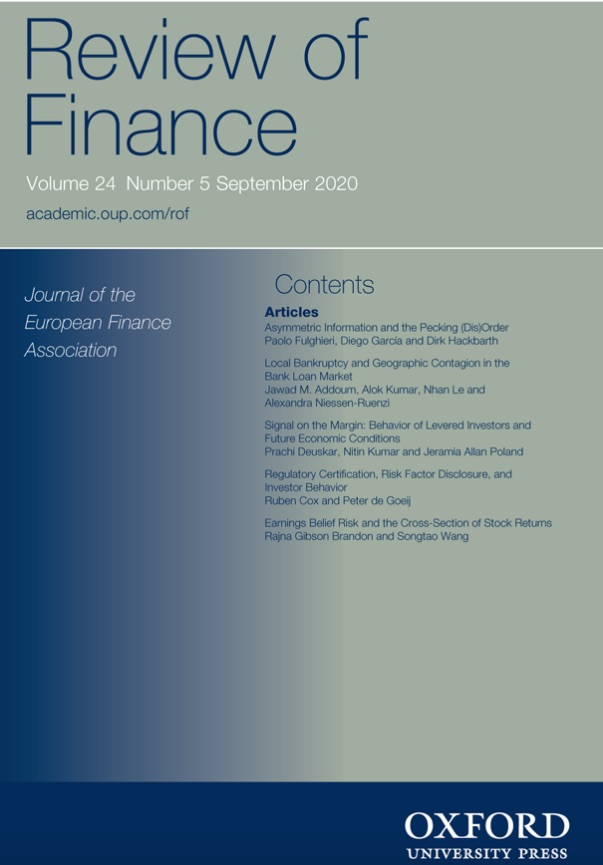
The Impact of Dark Trading and Visible Fragmentation on Market Quality
in: Review of Finance, No. 4, 2015
Abstract
Two important characteristics of current equity markets are the large number of competing trading venues with publicly displayed order books and the substantial fraction of dark trading, which takes place outside such visible order books. This article evaluates the impact on liquidity of dark trading and fragmentation in visible order books. Dark trading has a detrimental effect on liquidity. Visible fragmentation improves liquidity aggregated over all visible trading venues but lowers liquidity at the traditional market, meaning that the benefits of fragmentation are not enjoyed by investors who choose to send orders only to the traditional market.

Labor Market Volatility, Skills, and Financial Globalization
in: Macroeconomic Dynamics, No. 5, 2014
Abstract
We analyze the impact of financial globalization on volatilities of hours worked and wages of high-skilled and low-skilled workers. Using cross-country, industry-level data for the years 1970–2004, we establish stylized facts that document how volatilities of hours worked and wages of workers with different skill levels have changed over time. We then document that the volatility of hours worked by low-skilled workers has increased the most in response to the increase in financial globalization. We develop a dynamic stochastic general equilibrium model of a small open economy that is consistent with the empirical results. The model predicts that greater financial globalization increases the volatility of hours worked, and this effect is strongest for low-skilled workers.
Working Papers

Covered Bonds and Bank Portfolio Rebalancing
in: Norges Bank Working Papers, No. 6, 2021
Abstract
We use administrative and supervisory data at the bank and loan level to investigate the impact of the introduction of covered bonds on the composition of bank balance sheets and bank risk. Covered bonds, despite being collateralized by mortgages, lead to a shift in bank lending from mortgages to corporate loans. Young and low-rated firms in particular receive more credit, suggesting that overall credit risk increases. At the same time, we find that total balance sheet liquidity increases. We identify the channel in a theoretical model and provide empirical evidence: Banks with low initial liquidity and banks with sufficiently high risk-adjusted return on firm lending drive the results.

Cultural Resilience, Religion, and Economic Recovery: Evidence from the 2005 Hurricane Season
in: IWH Discussion Papers, No. 9, 2021
Abstract
This paper investigates the critical role of religion in the economic recovery after high-impact natural disasters. Exploiting the 2005 hurricane season in the southeast United States, we document that establishments in counties with higher religious adherence rates saw a significantly stronger recovery in terms of productivity for 2005-2010. Our results further suggest that a particular religious denomination does not drive the effect. We observe that different aspects of religion, such as adherence, shared experiences from ancestors, and institutionalised features, all drive the effect on recovery. Our results matter since they underline the importance of cultural characteristics like religion during and after economic crises.
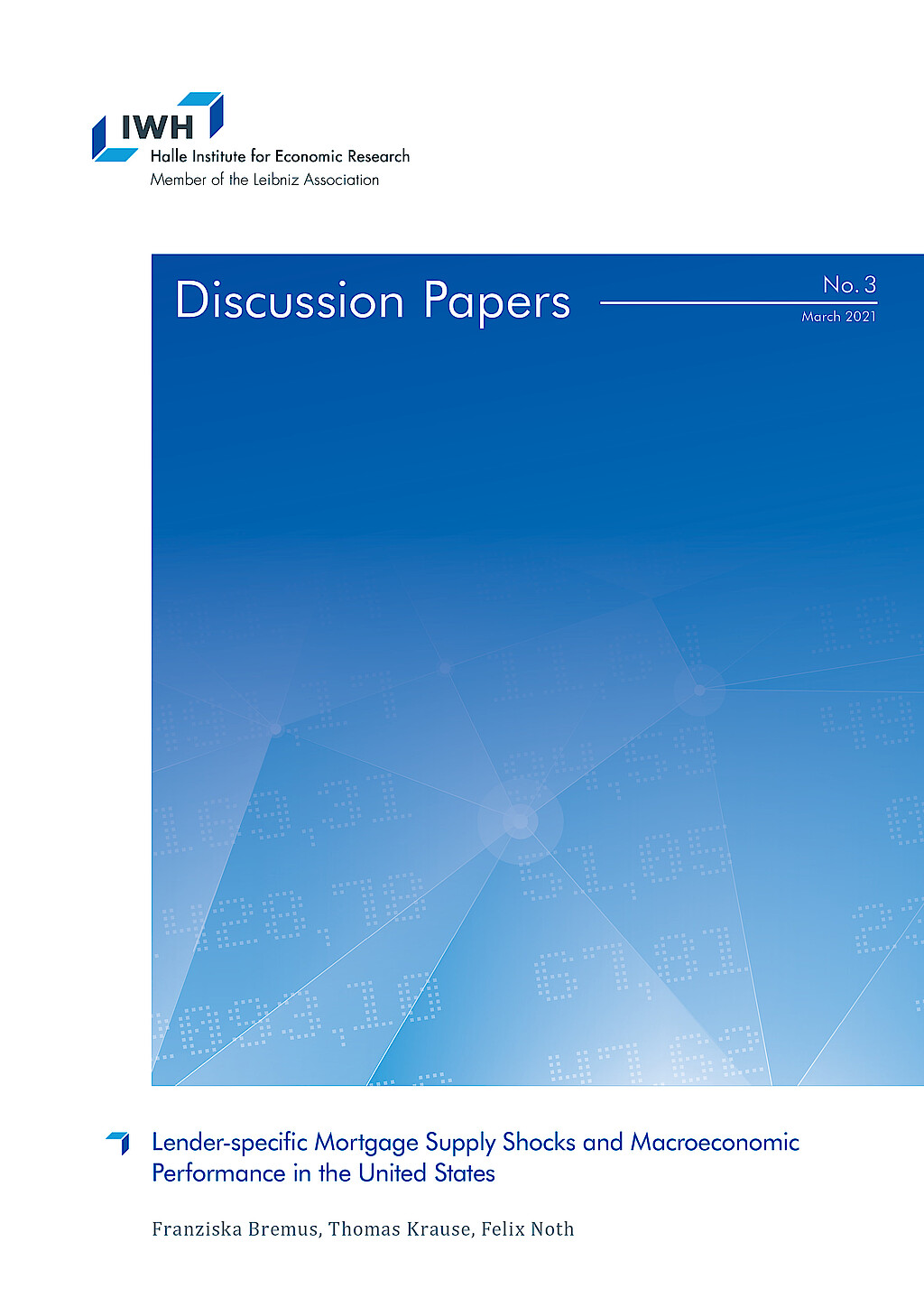
Lender-specific Mortgage Supply Shocks and Macroeconomic Performance in the United States
in: IWH Discussion Papers, No. 3, 2021
Abstract
This paper provides evidence for the propagation of idiosyncratic mortgage supply shocks to the macroeconomy. Based on micro-level data from the Home Mortgage Disclosure Act for the 1990-2016 period, our results suggest that lender-specific mortgage supply shocks affect aggregate mortgage, house price, and employment dynamics at the regional level. The larger the idiosyncratic shocks to newly issued mortgages, the stronger are mortgage, house price, and employment growth. While shocks at the level of shadow banks significantly affect mortgage and house price dynamics, too, they do not matter much for employment.
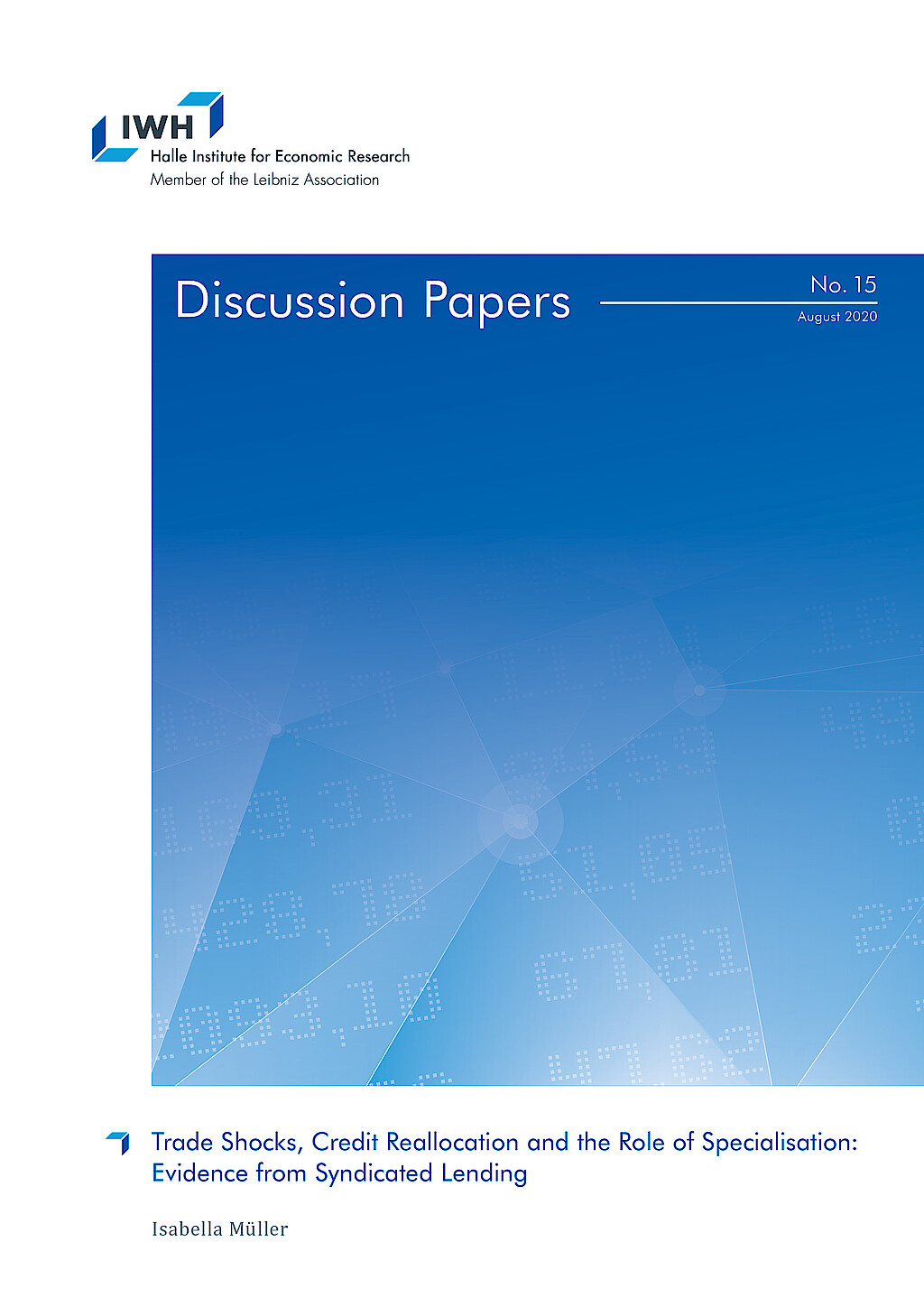
Trade Shocks, Credit Reallocation and the Role of Specialisation: Evidence from Syndicated Lending
in: IWH Discussion Papers, No. 15, 2020
Abstract
This paper provides evidence that banks cut lending to US borrowers as a consequence of a trade shock. This adverse reaction is stronger for banks with higher ex-ante lending to US industries hit by the trade shock. Importantly, I document large heterogeneity in banks‘ reaction depending on their sectoral specialisation. Banks shield industries in which they are specialised in and at the same time reduce the availability of credit to industries they are not specialised in. The latter is driven by low-capital banks and lending to firms that are themselves hit by the trade shock. Banks‘ adjustments have adverse real effects.
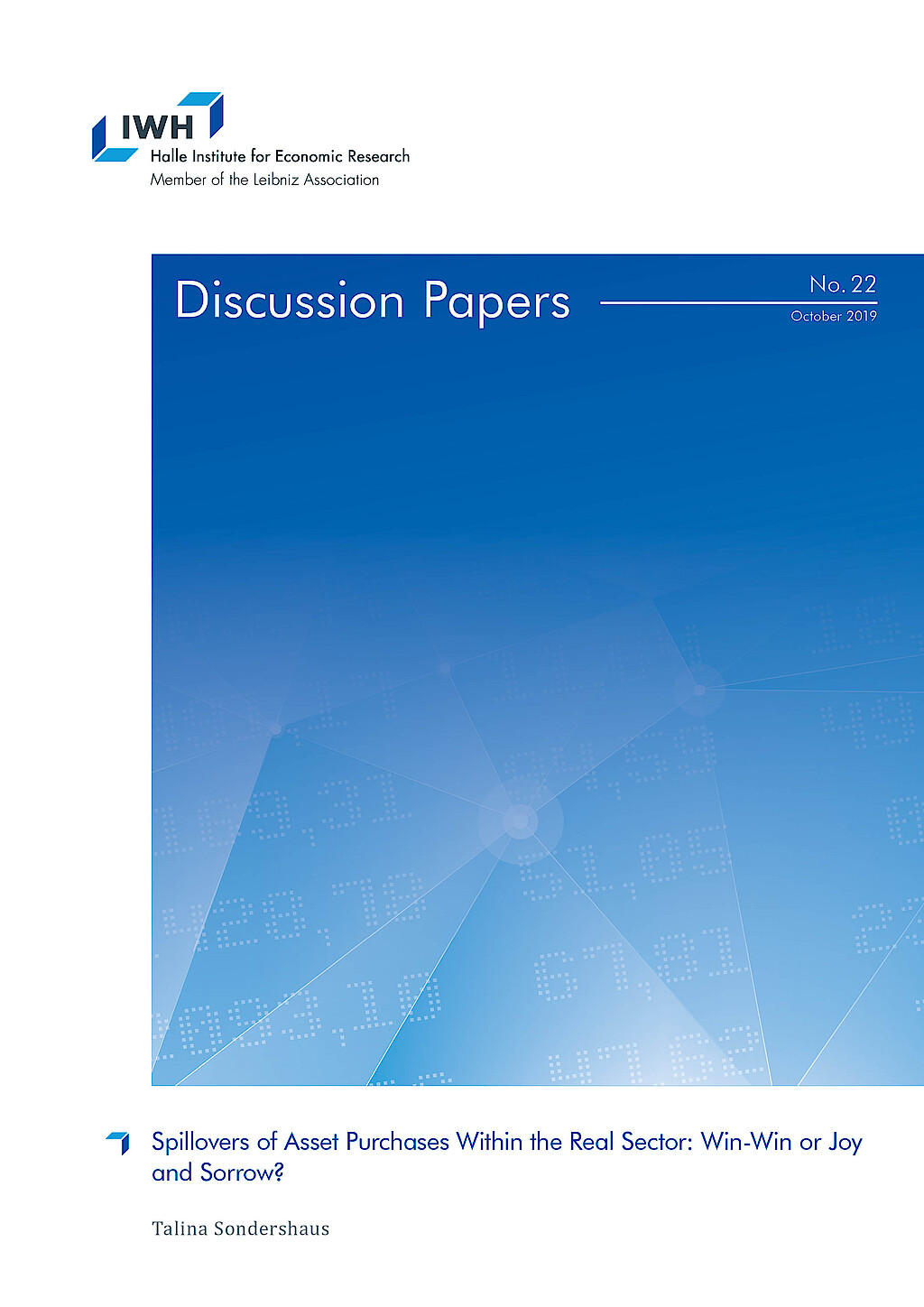
Spillovers of Asset Purchases Within the Real Sector: Win-Win or Joy and Sorrow?
in: IWH Discussion Papers, No. 22, 2019
Abstract
Events which have an adverse or positive effect on some firms can disseminate through the economy to firms which are not directly affected. By exploiting the first large sovereign bond purchase programme of the ECB, this paper investigates whether more lending to some firms spill over to firms in the surroundings of direct beneficiaries. Firms operating in the same industry and region invest less and reduce employment. The paper shows the importance to consider spillover effects when assessing unconventional monetary policies: Differences between treatment and control groups can be entirely attributed to negative effects on the control group.



















